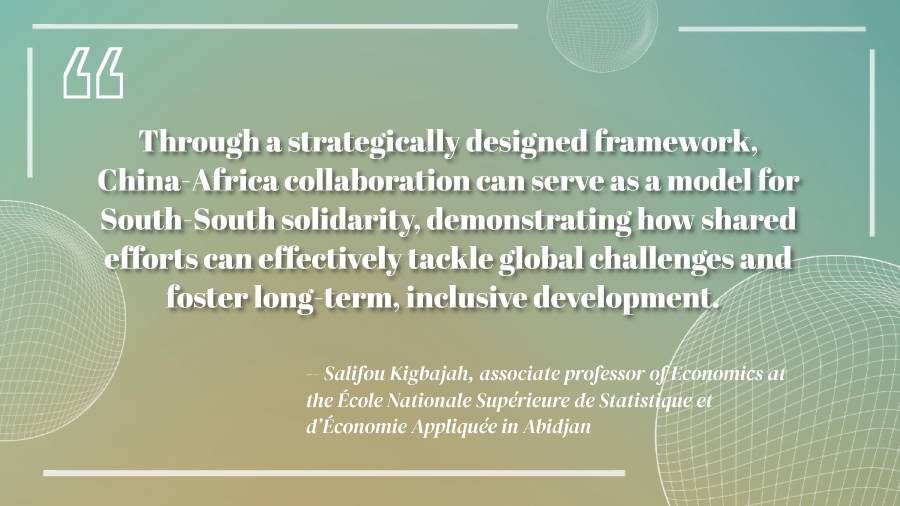

It is with immense pride that I reflect on the recent response from President Xi Jinping, which serves as both an affirmation and an encouragement for continued intellectual collaboration between China and Africa. As an Associate Professor of Economics at the École Nationale Supérieure de Statistique et d’Économie Appliquée (ENSEA) in Abidjan, I had the honor of participating in a pivotal gathering of 63 African scholars, where we collectively penned a joint letter to President Xi. This initiative arose from our shared commitment to deepening the cooperation between China and Africa and building on the lessons drawn from China’s remarkable development.

In President Xi’s letter of reply, he encouraged all scholars to continue to provide intellectual support for building a high-level China-Africa community with a shared future and safeguarding the common interests of the Global South. It was a gratifying affirmation of the profound willingness of African scholars to engage with China in mutual interest, and echoed the significance of deepening bilateral cooperation in sectors ranging from infrastructure to technology, reinforcing our shared goals for sustainable development and growth.
The Global South, a collective term for emerging economies, shares a common desire to narrow the developmental gap with the Global North, striving to improve key indicators across various sectors. To truly close this divide and build a more equitable and secure world, it is in the best interest of the Global South to intensify South-South cooperation. While the region demonstrates remarkable dynamism, significant obstacles remain, including threats of terrorism, energy insecurity, inadequate infrastructure, and the need for comprehensive structural economic reforms.
Despite the hurdles, the Global South holds the potential to drive prosperity in the near future, transforming social stigmas and improving the quality of life for millions by deepened collaboration. President Xi’s vision of building a community with a shared future for mankind can only be realized through increased exchanges and mutual learning among Global South nations. By embracing this approach, we can build a society that offers equality, greater opportunities, and enhanced well-being for all.
In this context, China-Africa collaboration serves as a model for South-South solidarity. The China-Africa partnership is poised to play a pivotal role in addressing some of the world’s most pressing challenges, including poverty, instability, and international trade disparities. As one of the global leaders in technology and major engines of economic growth, China has an essential role to play in helping Africa overcome longstanding issues.
One of the key indicators to assess the progress of China-Africa collaboration has been the growth of Chinese FDI in Africa. Between 2007 and 2021, China’s FDI in Africa grew more than tenfold, surpassing the United States in outward FDI to Africa in less than two decades. This shift underscores China’s growing role as Africa’s leading partner. The growing influence of China in Africa, particularly in infrastructure and investment, signals the continued deepening of ties between the two regions. The partnership holds the potential for even further expansion, particularly if China continues to diversify its investments into emerging sectors such as electric vehicles and services like finance.
China’s contributions to Côte d'Ivoire are also a prime example of the positive impact of this partnership. The construction of stadiums for the 2023 Africa Cup of Nations (AFCON), funded by Chinese companies, highlights the critical role China plays in infrastructure development. Between 2017 and 2021, Chinese FDI in Côte d'Ivoire grew at an average annual rate of 2.42%. Other significant infrastructure projects, such as the bridge connecting Plateau to Cocody, reflect the continued collaboration between China and Côte d'Ivoire.
Through a strategically designed framework, China-Africa collaboration can serve as a model for South-South solidarity, demonstrating how shared efforts can effectively tackle global challenges and foster long-term, inclusive development.
As China’s modernization continues to serve as a new model for development, its features offer critical lessons for African countries that transformative growth is possible in less than a century. This success story offers hope to the African continent, illustrating that substantial progress is within reach. Among China’s notable achievement is its poverty eradication model, a remarkable example of strategies tailored to its unique national context.
This development model, while rooted in China’s specific circumstances, can be adapted to fit Africa’s diverse needs. If we, as Africans, are committed to following a similar path—reducing poverty and accelerating economic growth—we must leverage local characteristics and innovations to create a sustainable framework for our own development.
African scholars play a crucial role in adapting China’s development model to suit the continent’s unique needs. By fostering collaboration between African and Chinese academics, we can build a robust framework for Africa’s growth. The widespread admiration for China’s achievements provides an opportunity for African researchers to contribute to the development of policy and strategy, informing decisions that will shape the continent’s future.
In conclusion, China-Africa relations have made tremendous progress over the years, with vast potential for future collaboration. As African countries continue their pursuit of modernization, the partnership with China provides invaluable lessons in how to achieve sustainable and inclusive development. With continued engagement, China and Africa can work together to build a brighter, more prosperous future for both regions and the Global South as a whole.
Contributed by Dr. Salifou Kigbajah, associate professor of Economics at the École Nationale Supérieure de Statistique et d’Économie Appliquée (ENSEA) in Abidjan.
点击右上角![]() 微信好友
微信好友
 朋友圈
朋友圈

请使用浏览器分享功能进行分享
